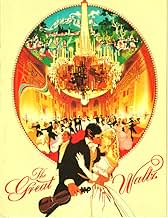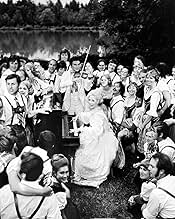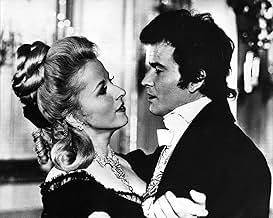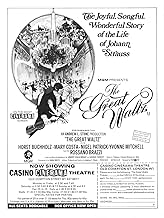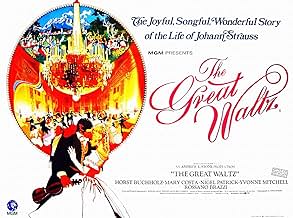NOTE IMDb
5,1/10
297
MA NOTE
Ajouter une intrigue dans votre langueComposer Johann Strauss becomes the "Waltz-King" and woos a baron's mistress in 19th-century Austria.Composer Johann Strauss becomes the "Waltz-King" and woos a baron's mistress in 19th-century Austria.Composer Johann Strauss becomes the "Waltz-King" and woos a baron's mistress in 19th-century Austria.
- Récompenses
- 1 nomination au total
Histoire
Le saviez-vous
- AnecdotesThis film was presented in the Cinerama format overseas. This would be the last film shown in Cinerama.
- GaffesAll of the men's hairstyles and sideburns are strictly in the longer, trendy 1972 international mode, a far cry from 19th-century Austria.
- ConnexionsFeatured in Strauss and Vienna: On Location: The Great Waltz (1972)
Commentaire à la une
I've always loved the music of Johann Strauss. Years ago I drove to a small theater in South Milwaukee to see the 1938 MGM movie *The Great Waltz*, a schmaltzy but well-made concoction with the inimitable Meliza Korjus and the very aggravating Louise Reiner that was very loosely based on Strauss's life.
Also years ago I bought a recording of the 1949 musical *The Great Waltz*, on which this movie is very loosely based. Like *The Song of Norway*, which had been a huge success on Broadway in 1944, mostly because of its elaborate dance numbers, "The Great Waltz" was a Robert Wright/George Forrest concoction that used music by the composer whose biography was more or less the subject of the show.
I never saw that show, so I don't know how similar this 1972 movie is to it. What I do know, however, is that this movie is a lavishly staged disaster. The script, what there is of it, is all cliches. (The scene where Strauss comes up with the idea for *Tales from the Vienna Woods* is stolen, poorly, from the 1938 movie.) It is interrupted repeatedly for no clear reason by a series of elaborate but not very interesting dance numbers. (Imagine an unimaginative *Seven Brides for Seven Brothers*.)
Worse still, most of the characters are not likable. Strauss Jr. comes off as an unfeeling womanizer, like his father before him. Strauss' wife isn't likable enough to earn our sympathies, even though he is not good to her.
In short, there's really nothing to like in this movie other than Strauss's music, which is well performed, and the scenery and costumes. (Much of the movie was evidently filmed in Austria.) The 1938 *Great Waltz* is not a great movie and has more than its share of chiches, but it's still a lot more enjoyable than this sad remake.
Also years ago I bought a recording of the 1949 musical *The Great Waltz*, on which this movie is very loosely based. Like *The Song of Norway*, which had been a huge success on Broadway in 1944, mostly because of its elaborate dance numbers, "The Great Waltz" was a Robert Wright/George Forrest concoction that used music by the composer whose biography was more or less the subject of the show.
I never saw that show, so I don't know how similar this 1972 movie is to it. What I do know, however, is that this movie is a lavishly staged disaster. The script, what there is of it, is all cliches. (The scene where Strauss comes up with the idea for *Tales from the Vienna Woods* is stolen, poorly, from the 1938 movie.) It is interrupted repeatedly for no clear reason by a series of elaborate but not very interesting dance numbers. (Imagine an unimaginative *Seven Brides for Seven Brothers*.)
Worse still, most of the characters are not likable. Strauss Jr. comes off as an unfeeling womanizer, like his father before him. Strauss' wife isn't likable enough to earn our sympathies, even though he is not good to her.
In short, there's really nothing to like in this movie other than Strauss's music, which is well performed, and the scenery and costumes. (Much of the movie was evidently filmed in Austria.) The 1938 *Great Waltz* is not a great movie and has more than its share of chiches, but it's still a lot more enjoyable than this sad remake.
- richard-1787
- 23 janv. 2018
- Permalien
Meilleurs choix
Connectez-vous pour évaluer et suivre la liste de favoris afin de recevoir des recommandations personnalisées
Détails
Box-office
- Montant brut aux États-Unis et au Canada
- 890 450 $US
- Durée2 heures 15 minutes
- Mixage
- Rapport de forme
- 2.35 : 1
Contribuer à cette page
Suggérer une modification ou ajouter du contenu manquant

Lacune principale
By what name was Toute la ville danse (1972) officially released in India in English?
Répondre
